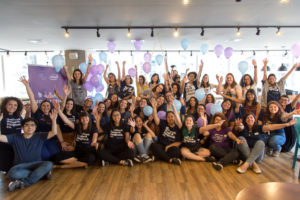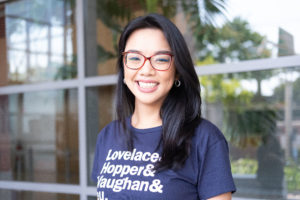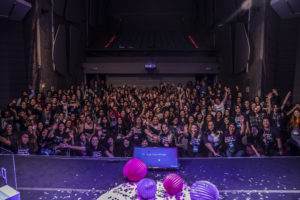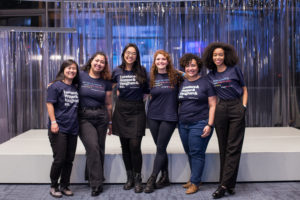
It all started with the idea of forming a group of women to learn to program. They were designers and journalists with an interest in learning but who lacked support and encouragement. Soon, they realized that the difficulties they encountered along the way were the same as many other girls and women. “We consume technology, but we are not participating in its production. Why?". From this restlessness and many reflections to Program was born in 2015 as a metasite about women and technology, which has been evolving year after year.
 “When we emerged, we participated in discussions about feminism, about the presence of women in predominantly male spaces. Our three main pillars were to promote inspiration, to promote debate and to promote learning opportunities”, explains Iana Chan, CEO and Founder of PrograMaria.
“When we emerged, we participated in discussions about feminism, about the presence of women in predominantly male spaces. Our three main pillars were to promote inspiration, to promote debate and to promote learning opportunities”, explains Iana Chan, CEO and Founder of PrograMaria.
“Over time, we understand that there is a journey for women in technology, which is marked by different challenges. Today, we know that there is a lack of incentives, a lack of examples and the very lack of diversity, which makes the area seem unattractive for women, in addition to all the gender stereotypes that are built around the female presence. in the areas of Exact and Science. It is still a hostile environment, which has evolved and we rely on companies that understand the importance of diversity and inclusion”, adds Iana.
Training and engagement
 Nowadays, ProgramaMaria has the mission of bringing more diversity to technology and develops actions on two main fronts: 1) Training, which are introductory programming courses for those who don't know anything and courses for those who are improving themselves; two) Engagement, which are the events, the journeys for the development and strengthening of this community, to encourage exchange and, above all, establish connections with companies that want to attract more women to their universe of employees. In this pillar is the PrograMaria Summit, an event that since 2017 celebrates diversity in technology and provides spaces for support, learning, mentoring, opportunity fair and a lot of connection.
Nowadays, ProgramaMaria has the mission of bringing more diversity to technology and develops actions on two main fronts: 1) Training, which are introductory programming courses for those who don't know anything and courses for those who are improving themselves; two) Engagement, which are the events, the journeys for the development and strengthening of this community, to encourage exchange and, above all, establish connections with companies that want to attract more women to their universe of employees. In this pillar is the PrograMaria Summit, an event that since 2017 celebrates diversity in technology and provides spaces for support, learning, mentoring, opportunity fair and a lot of connection.
Diversity and inclusion
ProgramMaria operates in partnerships with companies, which can be from IT or those who have gone through digital transformation processes, who are committed to encouraging diversity in the world of technology, and have already developed actions together with Globo, Grupo Boticário, Intel and TOTVS, among others. In 2023, the movement plans to launch new courses on Back End and Data Science.
 “The partnership with ABES puts us in contact with more companies technology, software, especially those committed to building a more technological and less unequal Brazil. A RH Tech platform allows to gather in a single space opportunities for people, especially young people, to access and build a journey of training within technology, considering that people are experiencing a shortage of professionals”, points out Iana.
“The partnership with ABES puts us in contact with more companies technology, software, especially those committed to building a more technological and less unequal Brazil. A RH Tech platform allows to gather in a single space opportunities for people, especially young people, to access and build a journey of training within technology, considering that people are experiencing a shortage of professionals”, points out Iana.
Currently, PrograMaria has a fundraising campaign #BoostAWomanInTech , which has the goal of raising enough money to offer 400 scholarships. And, if the goal is reached, the movement plans to double the final value, which will be equivalent to providing 800 scholarships in 2023.
About ProgramMaria
ProgramMaria wants empower girls and women by showing that they are capable of realizing their own ideas, whether inspire and encourage learning and communities.
The main objectives of the initiative are:
- Contribute so that more girls and women feel motivated and confident to explore the fields of technology, programming and entrepreneurship;
- Encourage debate about the lack of women in these fields;
- Promote opportunities and tools for them to take the first steps in learning to program.
Since its creation, Programaria has already reached around 12,000 people with the Eu ProgrAmo Online Courses, with approximately 5,000 scholarships distributed and a relationship base with more than 42,000 people.
Among the partner companies are Intel, Avanade, Globo, Trimble, Olist, TOTVS, Grupo Boticário, Thoughtworks, among other institutions committed to more diversity in technology.
* Credits Débora Monaco














